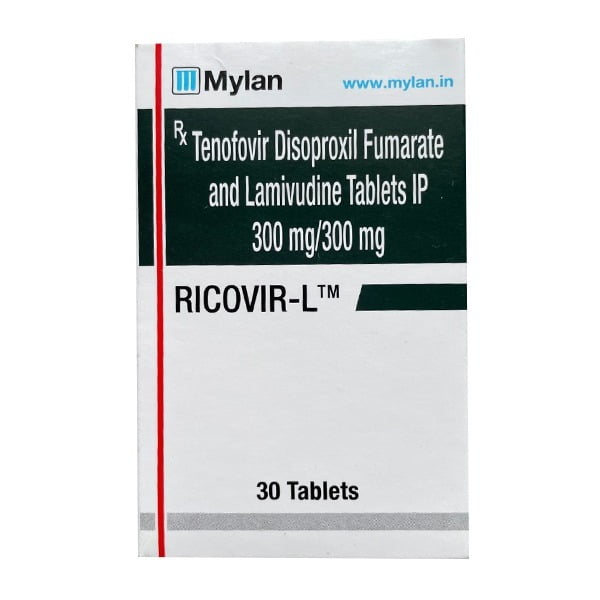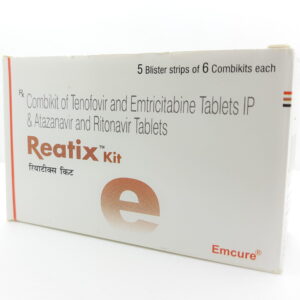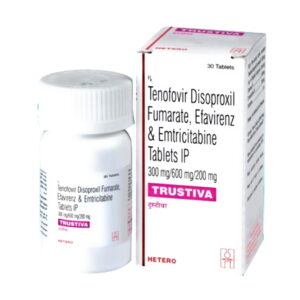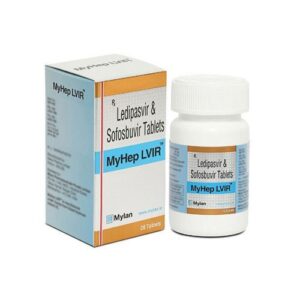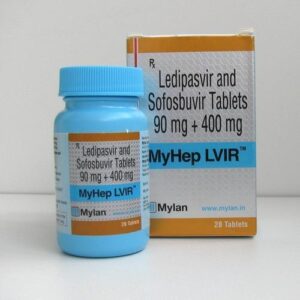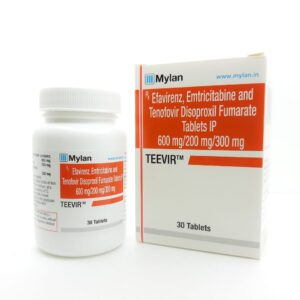Last Updated on July 20, 2024 by admin
Introduction to Ricovir L Tablets
Ricovir L tablets are a combination antiretroviral medication primarily used in the treatment of Human Immunodeficiency Virus (HIV) infection. These tablets combine two active ingredients, Lamivudine and Tenofovir disoproxil fumarate, each playing a crucial role in inhibiting the replication of HIV, thus helping to manage and control the infection. By combining these agents, the medication offers a potent and synergistic approach to suppressing the virus.
Lamivudine, also known as 3TC, is a nucleoside reverse transcriptase inhibitor (NRTI). It works by mimicking the natural nucleosides that HIV uses to replicate its genetic material, thereby incorporating itself into the viral DNA and causing premature chain termination. This inhibition prevents the virus from multiplying and spreading within the host’s body.
On the other hand, Tenofovir disoproxil fumarate is a nucleotide reverse transcriptase inhibitor (NtRTI). It also targets the reverse transcriptase enzyme but does so by converting into its active form, Tenofovir diphosphate, within the body. This active form competes with the natural substrate, deoxyadenosine 5′-triphosphate, and gets incorporated into the viral DNA, leading to chain termination and halting viral replication.
The combination of these two drugs in a single tablet offers a more convenient dosing regimen, enhancing patient adherence to treatment protocols. The synergistic effect of Ricovir L provides a robust barrier against the development of drug resistance, which is crucial in long-term HIV management.
Ricovir L tablets received approval from major health authorities such as the U.S. Food and Drug Administration (FDA) and the European Medicines Agency (EMA) after rigorous clinical trials demonstrated their efficacy and safety. Since their approval, these tablets have become an integral part of antiretroviral therapy (ART) regimens, significantly contributing to the improvement of life expectancy and quality of life for people living with HIV.
USES OF RICOVIR L TABLET
Medical Uses and Indications
Ricovir L tablets are primarily prescribed for the treatment of Human Immunodeficiency Virus (HIV) and hepatitis B virus (HBV) infections. The combination of these two potent antiviral drugs works synergistically to inhibit viral replication, thereby reducing the viral load in the patient’s body. This is crucial for improving immune function and overall patient outcomes.
Lamivudine, a nucleoside reverse transcriptase inhibitor (NRTI), interferes with the viral RNA-dependent DNA polymerase, resulting in chain termination and stopping viral replication. Tenofovir, on the other hand, is a nucleotide reverse transcriptase inhibitor (NtRTI) that also inhibits the activity of HIV-1 reverse transcriptase, an essential enzyme for viral replication. Together, these drugs provide a comprehensive approach to managing HIV and HBV infections.
For HIV treatment, Ricovir L tablets are often used as part of a combination antiretroviral therapy (cART) regimen. The recommended dosage for adults typically involves one tablet taken once daily, although the exact dosage may vary based on individual patient factors such as kidney function and co-existing medical conditions. For patients with chronic hepatitis B, the dosage remains similar, but ongoing monitoring and possible dose adjustments are necessary to manage the disease effectively over the long term.
Initial treatment with Ricovir L tablets aims to swiftly reduce the viral load and improve CD4 cell counts, thereby enhancing the patient’s immune response. For long-term therapy, the focus shifts to maintaining viral suppression, preventing disease progression, and minimizing the risk of developing drug resistance. Regular monitoring through blood tests is essential to ensure the effectiveness of the treatment and to make any necessary adjustments.
In summary, the role of Ricovir L tablets in treating HIV and hepatitis B is well-established, providing significant benefits in terms of viral suppression and immune system support. Proper adherence to prescribed dosages and regular follow-up with healthcare providers are key to achieving optimal treatment outcomes.
Benefits and Efficacy
Ricovir L tablets have established themselves as a cornerstone in the treatment of HIV and hepatitis B, offering significant benefits and high efficacy rates. Clinical trials have demonstrated that this combination therapy is remarkably effective in reducing viral loads in patients. For instance, a study published in the “New England Journal of Medicine” found that patients who were administered Ricovir L tablets experienced a more substantial decrease in HIV RNA levels compared to those on alternative antiviral treatments.
When discussing the efficacy of Ricovir L tablets, it is noteworthy to consider the dual-action mechanism that targets both HIV and hepatitis B. This dual effectiveness is particularly advantageous for patients co-infected with both viruses, providing a more comprehensive approach to antiviral therapy. In addition to clinical trial data, real-world evidence and patient testimonials corroborate these findings. Many patients report significant improvements in their quality of life, including increased energy levels and a reduction in the frequency of opportunistic infections.
Comparatively, Ricovir L tablets have shown superior outcomes when juxtaposed with other antiviral treatments. For example, in a head-to-head study against a combination of Zidovudine and Lamivudine, the Ricovir L regimen was associated with higher rates of viral suppression and lower incidences of drug resistance. This makes it a preferred option among healthcare providers for first-line treatment.
Furthermore, patient compliance tends to be higher with Ricovir L tablets due to their once-daily dosing schedule, which simplifies medication regimens and enhances adherence. The convenience of a single-pill regimen cannot be overstated, as it significantly reduces the pill burden on patients, thereby improving their overall treatment experience.
In summary, the benefits and efficacy of Ricovir L tablets are well-supported by clinical evidence and real-world experiences. They offer a powerful, convenient, and highly effective option for managing HIV and hepatitis B, ultimately contributing to better patient outcomes and enhanced quality of life.
Potential Side Effects and Precautions
Ricovir L tablets, while effective in treating certain viral infections, come with a range of potential side effects. Common side effects experienced by patients include nausea, fatigue, and headache. These symptoms are usually mild and can often be managed with supportive care. However, it is important for patients to be aware of these possibilities and to consult their healthcare provider if they persist or become bothersome.
More severe but rare adverse reactions can also occur. These include liver toxicity and lactic acidosis, conditions that require urgent medical attention. Liver toxicity may manifest through symptoms such as jaundice, dark urine, and significant abdominal pain. Lactic acidosis, a buildup of lactic acid in the bloodstream, can present with muscle pain, rapid breathing, and severe weakness. If any of these symptoms are observed, it is crucial to seek immediate medical care.
Patients should also be informed about contraindications and necessary precautions. Ricovir L tablets are not suitable for everyone. Specific populations, such as pregnant women, individuals with pre-existing kidney issues, and those taking other medications, need to exercise caution. Pregnant women should only use these tablets if the potential benefits justify the potential risks to the fetus. Additionally, individuals with kidney problems may require dose adjustments or alternative treatments to avoid exacerbating their condition.
Drug interactions can also influence the safety and efficacy of Ricovir L tablets. Therefore, it is essential that patients disclose all medications they are currently taking to their healthcare provider. This includes prescription drugs, over-the-counter medications, and dietary supplements. Comprehensive disclosure helps in preventing harmful interactions and ensures a safer treatment regimen.
In summary, while Ricovir L tablets are beneficial for managing specific viral infections, patients must be aware of potential side effects and take necessary precautions. Regular consultation with healthcare providers, along with prompt reporting of any adverse symptoms, significantly contributes to the safe and effective use of this medication.
SIDE EFFECTS OF RICOVIR L TABLET
Common side effects of Ricovir L
- Dizziness
- Nausea
- Diarrhea
- Tiredness
- Weakness
- Fever
- Insomnia (difficulty in sleeping)
- Cough
- Depression
HOW TO USE RICOVIR L TABLET
SAFETY ADVICE

Alcohol

Pregnancy

Breast feeding

Driving

Kidney

Liver
 CHILDREN CAUTION
CHILDREN CAUTIONUNSAFE
Ricovir L Tablet is not recommended for use in children and adolescents below 18 years.
WHAT IF YOU FORGET TO TAKE RICOVIR L TABLET
If you miss a dose of Ricovir L Tablet, take it as soon as possible. However, if it is almost time for your next dose, skip the missed dose and go back to your regular schedule. Do not double the dose.
- You have been prescribed Ricovir L Tablet for the treatment of chronic hepatitis B virus (HBV) infection.
- In combination with other medicines, it is used for the treatment of HIV infections.
- Take it with food, as this increases the absorption of the medicine into the body.
- Ricovir L Tablet may cause dizziness or sleepiness. Do not drive or do anything requiring concentration until you know how it affects you.
- You may still develop infections or other illnesses associated with viral infection while taking this medication.
- You can also pass on HIV or HBV to others. Don’t share needles or personal items that can have blood or body fluids on them.
- During treatment and for at least six months after stopping this medicine, regular blood tests are needed to monitor your liver function, level of hepatitis B virus and blood cells in your blood.
FAQ: Ricovir L Tablets
1. What are Ricovir L used for?
Ricovir L are antiretroviral medications used primarily for the treatment of HIV (Human Immunodeficiency Virus) infection. They are also used in the treatment of chronic hepatitis B.
2. When is the best time to take Ricovir L?
It is generally recommended to take Ricovir L at the same time each day, with or without food. Consult your healthcare provider for specific recommendations based on your treatment plan.
3. What are the long-term side effects of Ricovir L?
Long-term use can lead to potential side effects including kidney damage, bone density loss, and lactic acidosis. Regular monitoring by a healthcare professional is advised.
4. Can you provide a review of Ricovir L?
Reviews of Ricovir L suggest that they are effective in managing HIV when taken consistently. Most patients report manageable side effects, but individual experiences can vary.
5. What are the common uses of Ricovir L?
They are commonly used for the treatment of HIV infection and chronic hepatitis B, helping to reduce viral load and improve immune function.
6. What is the recommended dosage of Ricovir L?
The typical dosage is one tablet containing 300 mg of Lamivudine and 300 mg of Tenofovir once daily. However, dosage may vary based on individual circumstances, so always follow your doctor’s instructions.
7. Is it safe to use Ricovir L?
Yes, when prescribed by a healthcare professional and used correctly, Ricovir L are considered safe for most patients. Regular monitoring is essential.
8. Does Ricovir L cure HIV infection?
No, Ricovir L do not cure HIV infection. They are effective in managing the virus and preventing progression to AIDS.
9. Are Ricovir L safe in pregnancy?
Ricovir L are generally considered safe for use during pregnancy, but it is crucial to consult a healthcare provider for personalized advice.
10. Can Ricovir L be used on children?
Yes, Ricovir L can be used in children, but the dosage and treatment plan should be determined by a healthcare provider based on the child’s age and weight.
11. What if I miss a dose of Ricovir L?
If you miss a dose, take it as soon as you remember. If it’s almost time for your next dose, skip the missed dose and resume your regular schedule. Do not double up on doses.
12. Can I stop taking Ricovir L?
Do not stop taking Ricovir L without consulting your healthcare provider. Stopping treatment can lead to increased viral load and resistance.
13. What are the uses of Ricovir L?
The primary uses are for the treatment of HIV infection and chronic hepatitis B. They help control viral replication and improve immune function.
14. Are there alternative medications to Ricovir L?
Yes, there are alternative antiretroviral medications available, including other NRTIs (nucleoside reverse transcriptase inhibitors) and different classes of HIV medications. Consult your healthcare provider for options.
15. Can Ricovir L interact with other medications?
Yes, Ricovir L can interact with other medications, including certain antiviral, antifungal, and antibiotics. Always inform your healthcare provider about all medications you are taking.
16. How long does it take for Ricovir L to show results?
Patients may start to see improvements in viral load within a few weeks of starting treatment, but complete viral suppression may take longer. Regular follow-up with your healthcare provider is essential.
Q: 17. What precautions should be taken while using Ricovir L?
Patients should have regular kidney function tests and be monitored for any side effects. It is also important to stay on a consistent dosing schedule and avoid missing doses.
Q: 18. Where can I get more information about Ricovir L?
More information can be found on reputable medical websites such as the CDC (Centers for Disease Control and Prevention), NIH (National Institutes of Health), and the FDA (Food and Drug Administration).
Q: 19. What is the success rate of Ricovir L in treating HIV?
The success rate varies by individual, but studies have shown that when taken consistently, Ricovir L can effectively suppress viral load in the majority of patients.
Q: 20. Can I find references for the information provided?
Yes, you can find references and more detailed information at:
– [CDC – HIV Treatment](https://www.cdc.gov/hiv/basics/livingwithhiv/treatment.html)
– [NIH – HIV/AIDS Treatment](https://aidsinfo.nih.gov/)
– [FDA – Tenofovir and Lamivudine Information](https://www.accessdata.fda.gov/drugsatfda_docs/label/2020/021098s025lbl.pdf)
Always consult your healthcare provider for personalized medical advice and treatment plans.
References:
- Goodman & Gilman’s, The Pharmacological Basics of Therapeutics, Antiretroviral agents and treatment of HIV infection, 12th edition, 2011, 1632-1634.
- KD Tripathi, Essentials of Medical Pharmacology, Antiviral drugs, 7th edition, 2013, 809-810.
- Drugs.com. Lamivudine Pregnancy and Breastfeeding Warnings. [Accessed 31 Mar. 2019] (online) Available from – https://www.drugs.com/pregnancy/lamivudine.html

